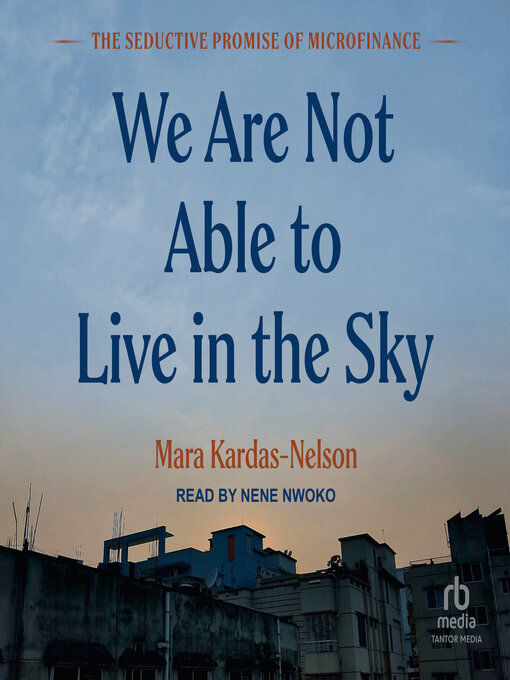We Are Not Able to Live in the Sky
The Seductive Promise of Microfinance
Mara Kardas-Nelson's We Are Not Able to Live in the Sky is a story about unintended consequences, blind optimism, and the decades-long ramifications of seemingly small policy choices. The book is rooted in the stories of women borrowers in Sierra Leone, West Africa, whose narratives are set against the rise of Yunus's vision that tiny loans would "put poverty in museums," as well as a deep history of modern international development. Kardas-Nelson asks: What is missed with a single, financially-focused solution to global inequity that ignores the real drivers of poverty? Who stands to benefit and, more important, who gets left behind?
-
Creators
-
Publisher
-
Release date
June 25, 2024 -
Formats
-
OverDrive Listen audiobook
- ISBN: 9798855529975
- File size: 492688 KB
- Duration: 17:06:25
-
-
Languages
- English
-
Reviews
-
Publisher's Weekly
Starred review from April 15, 2024
Microfinance, a novel approach to financing small-scale business ventures in the developing world “that had promised to uplift millions,” may have “quietly died” in the Western media, writes journalist Kardas-Nelson in her eye-opening debut exposé, but meanwhile it’s been wreaking havoc around the globe. Throughout the 2000s, microlending—the issuing of tiny loans to aspiring small business owners—was widely celebrated, earning its progenitor, banker Muhammad Yunus, the Nobel Peace Prize. However, by the time Kardas-Nelson traveled to Sierra Leone in 2015 for a job with a health organization, the hype had ended and, quite literally, the bill had come due. Learning from locals that it had become routine for women (the scheme’s original intended beneficiaries) to be arrested and imprisoned over microfinance debts, Kardas-Nelson decided to investigate. Through extensive archival research, she pieces together an account of the 20th-century rise of microfinance as part of America’s “international development” apparatus, revealing how starry-eyed American “activists, feminists, and funders... create the conditions” for today’s global predatory lending problems. She also profiles women in Sierra Leone and Bangladesh struggling to pay off microfinance debts, reporting that a mere three out of the 100 businesswomen she interviewed believe the loans had actually helped them. Kardas-Nelson’s crisp characterizations and novelistic storytelling bring clarity to a sprawling, shadowy history. The result is a devastating look at a disaster set into motion by misguided American policymakers.
-
Loading
Why is availability limited?
×Availability can change throughout the month based on the library's budget. You can still place a hold on the title, and your hold will be automatically filled as soon as the title is available again.
The Kindle Book format for this title is not supported on:
×Read-along ebook
×The OverDrive Read format of this ebook has professional narration that plays while you read in your browser. Learn more here.

